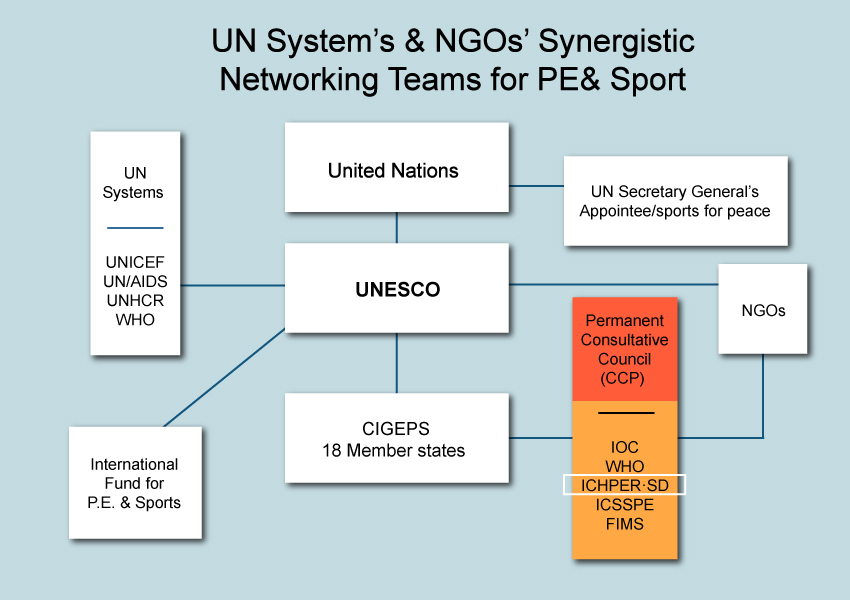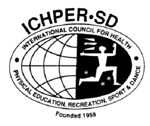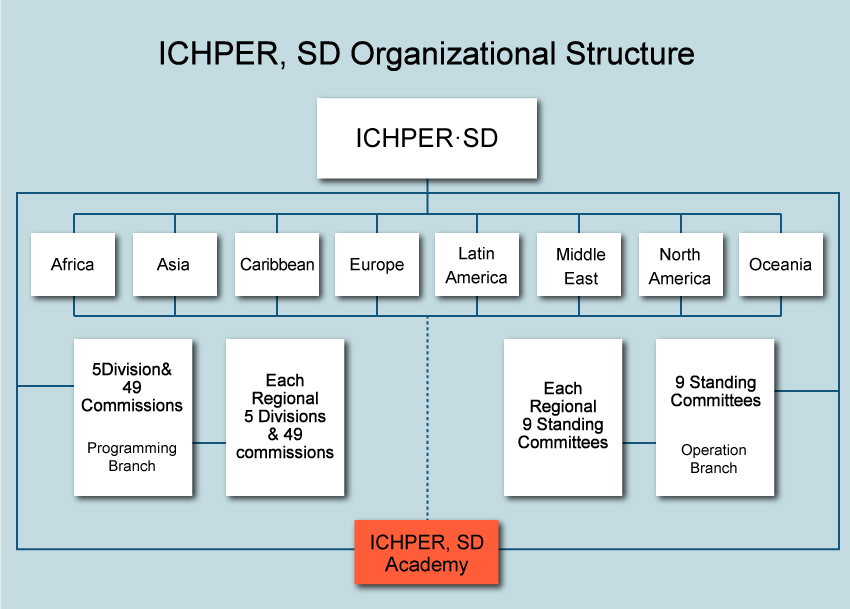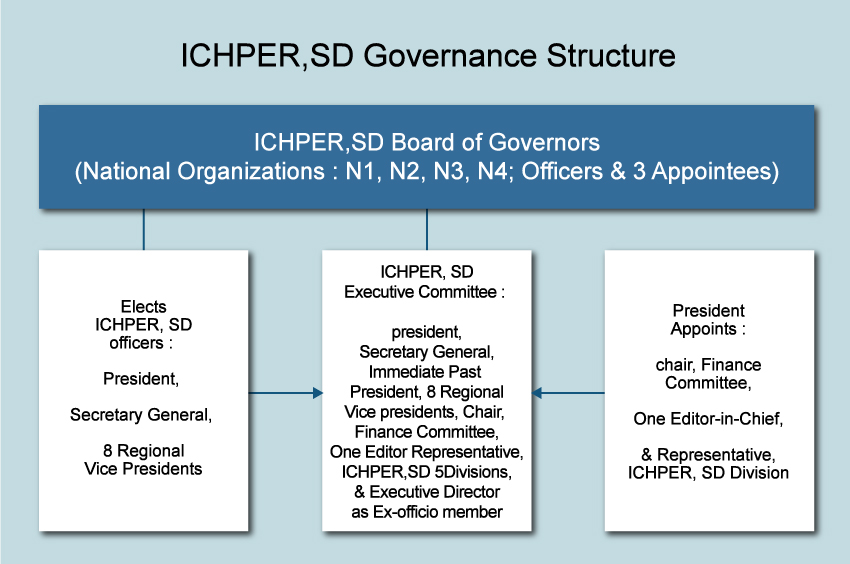ICHPER∙SD
Publishes the Journal of ICHPER∙SD four times a year, the ICHPER∙SD Journal of Research two times a year, world congress proceedings, regional congress proceedings, position papers and resolutions.
Has provided the Journal of ICHPER∙SD and the ICHPER∙SD Journal of Research to all ICHPER∙SD members and library members, IOC, UNESCO, WHO, National Olympic Committees(NOC's) and International Sport Federations (IFs) in 2008 countries and self-governing territories.
The Role of ICHPER·SD
ICHPER·SD has been working in a partnership with the United Nations Education, Scientific and Cultural Organization (UNESCO) for 48 years and with the International Olympic Committee (IOC) for the last 14 years. It has championed the promotion of quality physical education (including health, movement related physical activity and fitness, recreation and dance education) and sport especially in schools, learning & social institutions, universities, research and scholarly organizations.
The Mission of ICHPER·SD
The mission of ICHPER·SD is defined and precisely stipulated in the ICHPER·SD Bylaws. They are the cornerstone of the Council's programs and represent what we stand for:
1)development of curriculum standards and programs for schools;
2) assistance in program development, worldwide,
3) advocating and promotion of daily, quality physical education, but also sport, recreation, dance as leisure programs for school children/youth, all global citizens.
4) advocating and promotion of peace … much more things through; 4)… 5)… 6) …7) …8); and 9) ICHPER·SD shall collaborate with other organizations with similar aims, such as UNESCO, the International Olympic Committee (IOC), and the World Health Organization (WHO)

UNESCO and ICHPER·SD
The actualization of a joint project of ICHPER·SD and UNESCO. The "Three International Standards: Commitment toward the Delivery of Quality Physical Education to School Children / Youth, Worldwide" ranks in importance with the International Charter of Physical Education and Sport.
In March 2004, UNESCO through its Division for the Promotion of Quality Education informed the Office of the ICHPER·SD President that the Standards were approved and adopted by UNESCO/CIGEPS, and thus they became official "Authoritative Text"
ICHPER·SD Promotes and Advocates: "One essential condition for the effective exercise of human rights is that all people should be free to develop and preserve their physical, intellectual and moral powers, and that access to physical education and sport should be assured and guaranteed for all human beings (UNESCO International Charter of Physical Education and Sport, adopted in1978)".
IOC and ICHPER·SD
ICHPER·SD holds the status of IOC Recognized Organization and works to promote the Olympic Movement. In 1889, Coubertin stressed the utilization of sport in a setting of school-based physical education for the education of peace (Coubertin & Muller, 2000). The Olympic Charter states,
The late 7th IOC President Juan Antonio Samaranch, (The Most Progressive Reformer) stated on many occasions that, "The Olympic Movement is primarily an education movement" (1984, 1996, 2000).
The late 7th IOC President Juan Antonio Samaranch, (The Most Progressive Reformer) He also stressed that a fundamental principle of Olympism is "after all, non-discrimination" (Samaranch, A.J.: 2001).
It is a fact that professionals in the areas of physical education (including health, recreation, sport, dance, and other physical movement related education and activities) are the first facilitators for Olympism and have certainly played integral leadership roles ever since the creation of the International Olympic Committee (IOC) in 1894 (Senn, A.E: 1999)
- Baron Pierre de Coubertin (1863 - 1937) - and continuing with the IOC President Dr. Jaques Rogge in 2003. Olympic education should be offered as part of the curriculum content of a quality physical education class as early as the first grade.
This is also a cornerstone of the ICHPER·SD mission upon which we will continuously build and strengthen, because we have the scientific data that is reflected in the 52nd ICHPER·SD World Congress Theme: "Quality Physical Activity Education … a Gateway to … Olympic Caliber Performance." Gateway to Health and Olympic Caliber Performance."
International Council for Health, Physical Education, Recreation, Sport, and Dance

ICHPER·SD
As a Leading Organization in the Field of HPERD Academic & Scientific Professionals' International Organizations
The Birth, Status, Achievements, and Selected Highlights
The Birth of ICHPER·SD and its Relation to AAHPERD
- In 1950, ICHPER (now ICHPER·SD) was the outgrow of an idea first conceived by the Board of Directors of AAHPER (now AAHPERD).
- In 1958, ICHPER·SD was founded in Rome, Italy.
- ICHPER·SD headquarters has been housed in AAHPERD in U.S. since 1958.
American Alliance for Health, Physical Education, Recreation and Dance (AAHPERD)
AAHPERD - is the Oldest, Largest,& Most Prestigious National Organization in the world
AAHPERD - American Association for Health Education
- American Association for Physical Activity & Recreation
- National Association for Girls & Women in Sport
- National Association for Sport and Physical Education (NASPE)
- National Dance Association (NDA)
ICHPER·SD as an International Professionals' Organization
ICHPER·SD is a non-profit, charitable, educational and scientific organization; is one of the oldest, largest and most prestigious international alliance of HPERSD professionals and organizations in the world.
Since the founding of this organization in 1958
ICHPER·SD has staged: 32 World Congresses 4 ICHPER·SD Africa Regional Congresses; 5 Asia Regional Congresses; 11 Europe Regional Congresses; 5 Latin America Regional Congresses; 4 Middle East Regional Congresses 2 North America and 1 Caribbean Regional Congresses & 17 ICHPER·SD Forums; and 1 Oceania Regional Congress.


Themes of the Past ICHPER,SD Anniversary World Congresses
Theme of the 52nd ICHPER,SD Anniversary World Congress
May 8-12, 2010 in doha, Qatar
"Quality Physical Activity Education and Science for All : A gataeway to health and Olympic Caliber Performance"
Themes of the past World Congresses
| 2008, Kanoya, Kagoshima, Japan |
Local and Golbal aspects of the promotion of Health, sports and physical Activity Education : A Renewed Commitment for the Second 50 years |
| 2005, Istanbul, Turkey |
New vision, New Mission, New Strategies : HPERSD as an Integral part of the lifelong Quality Education of the Whole person |
| 2002, Taipei, Taiwan |
Pursuit of wellness in the new millennium : contributions of health, Physical Education, Recreation, Sport, and dance |
| 1999, Cairo, Egypt |
Developing Strategies of international cooperation in promotion of HPERSD for the new Millennium |
| 1997, Seoul, Korea |
Revitalization of Humanity and better Environment |
| 1995, Gainesville, Florida, USA |
To explore Scientific and Pragmatic Aspects of HPERSD |
| 1993, Yokohama, Japan |
Creating Active Lifestyles : Health, Physical Education, and Recreation in lifelong Learning |
| 1991, Limerick, Ireland |
Looking Ahead to the 21st century |
| 1989, Frostburg, Maryland, USA |
Critical Issues in HPER : A Glabal Analysis |
| 1987, Vancouver, Canada |
Towards the 21st century |
| 1985, London, England |
Education for living : the Contributions of HPER |
| 1983, Netanya, Israel |
HPER and D inPerspective |
| 1981, Manila, Philippines |
Towards Quality of Life though HPER |
| 1979, Kiel, West Germany |
Movement, Health and Recreation Education Through Activity |
| 1977, Mexico city, Mexico |
HPER for everyone |
| 1975, Rotterdam, Netherlands |
HPER in the Near Future |
| 1973, saunr Denpasar, Indonesia |
HPER in National Development |
| 1972, London, England |
The Child and Teacher in health |
Continued Themes of the Past ICHPER·SD Anniversary World Congresses
| 1971, kingston Jamaica |
New Directions ofr the 1970’s |
| 1970, Sydney, Australia |
New Endeavors in HPER |
| 1969, Adidjan, Ivory Coast |
Improving the Teaching of HPER |
| 1968, Dublin, Ireland | Developing Leadership in HPER |
| 1967, Vancouver, Canada |
Decade of progress |
| 1966, Seoul, Korea | Educational Planning in HPER |
| 1965, Addis Ababa, Ethiopia |
Equal Opporitunity Through Education |
| 1964, Paris, France : HPER |
A means for Increasing International Understanding |
| 1963, Rio De Janeiro, Brazil |
Quality Teaching in HPER |
| 1962, Stockholm, Sweden |
HPER in a technical Age |
| 1961, New Delhi, India |
The Teaching of Responsibility Through P.E. and Recreation |
| 1960, Amsterdam, Netherlands |
Physical Education’s Contribution to Education |
| 1959, Washington, D.C., USA |
Child Health and the school |
| 1958, Rome, Italy |
Child Health and the school |















